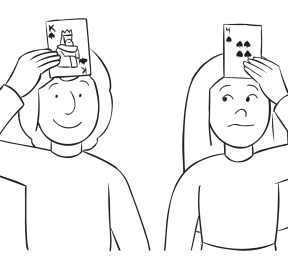Twist on Traditional Getting to Know You Activities

Categories Twist
Entertaining variation of archetype Two Truths & Lie game.
- Playful & fun
- Intriguing get-to-know-you game
- Inspires inventiveness
- Strengthens relationships
- No props
Pace-by-Step Instructions
- Form pocket-size groups of ii, three or four people.
- Each group spends 5 to ten minutes discussing what they all accept in common.
- In chat, each grouping identifies ii things which all grouping members take in common, and 1 matter which is true for at least one fellow member but non the whole grouping.
- When set, gather all groups together.
- Taking turns, each group announces their 3 'mutual attributes' as deadpan equally possible.
- The remainder of the groups aim to identify which one of the three attributes is the lie.
- Aim to seek consensus, but settle for a majority if necessary.
- Finally, the nominated group reveals the correct reply.
- Repeat this process until all groups have revealed their lie.
Video Tutorial
Video Transcript for Categories Twist
presented past Mark Collard
So hither's your side by side task, in your small grouping of 3 or four people, I am going to ask you to have chat over the next couple of minutes. And your task is to cease upwards with three let's call them categories.
You are going to end upward with three categories. Two of those three are going to be true, the third one which will be secret to every other grouping is going to be not true. It is going to exist false. It could exist even considered a lie.
Here is what I hateful by the category, that is the two things that you identify must, all three or four of you in your grouping, must accept in common.
Then it might be that you've all been to the Melbourne Zoo. And then all three of you lot, subsequently a conversation, take discovered that you have all been to the Melbourne Zoo. And the other one might be that you all have driven a car with your hand-restriction on for at least a kilometre. Something really kind of koooky.
The reason that you want to go for the less than obvious is because when you get to your third i, the 1 which is perhaps a lie or not quite true, is that it needs to be still kind of out there that it could almost be true.
Because hither is your task once you accept identified those three, two of which are truthful for all of the people in your group, three or iv of yous, all of you can say yes that y'all have that in common with each other, and the third one not everyone has in mutual. In fact none of you may accept in mutual.
Is that you are going to share those three things with another group, or maybe other groups depending on how our numbers piece of work, and the other group after having heard, equally deadpan as possible those iii categories, take to place which 1 is the lie.
So this is categories with a twist. And so the two categories are true, everyone in your grouping has in common, and then in that location is one that you make up that sounds like it could be but information technology isn't.
Take a couple of minutes now to identify your list of iii. Get.
(Groups are discussing strategies for Categories Twist)
Okay, so I think that virtually groups now have got there three. So we take got two in your categories that are absolutely true. Everyone in your small group can say Yep to the question, aye that has occurred, that has been an experience that nosotros've said we've been, and say Yes to that thing.
And then there is one that'll sound like it can be true, but information technology actually isn't.
The manner it'll piece of work is your little group will share to the group on your left, your three, in as deadpan mode equally possible not giving abroad which 1 is the lie. The other three or four people will accept a curt corporeality of time to come to consensus which one of the 3 statements is the prevarication.
Now the rest of the other groups you tin all accept your ain opinions, you don't get to contribute. Only just the three or four that are actually being spoken to will have the gamble to reply, so we will just work our way around the group.
Got the bones idea?
Alright, and so we will start with my group off to my left hand side here. So who is the responsible spokesperson? Josh, y'all've got information technology.
And so as deadpan as possible without indicating which 1 could be the prevarication, only yous know 1 of them will exist, so Josh when you are fix y'all may beginning.
(So we've all owned a dark-brown canis familiaris, we've all at some phase accept had blonde pilus, and nosotros've all been to a wax museum.)
Okay so those iii things again are?
( We've all owned a brown dog, we've all at some stage have had blonde pilus, and we've all been to a wax museum.)
Okay, wax museum, blonde hair, brownish domestic dog. Which 1 of those three…
(Blonde hair?) Blonde
So in that location's i statement in those iii that these iv do non have in common. Which one is it?
(Hums Jeopardy song)
So Josh practise you have an respond, are y'all ready to lock in an answer?
(The blonde hair)
Alright you believe the one that anybody has had blonde hair some fourth dimension in their life is the false 1? (Yes)
Is that correct grouping?
(Aye that is right)
It is correct!
How To Play Narrative
People merely love to observe out stuff near other people'due south lives – even when it'south not true!
This activity – a fun variation of the standard Ii Truths and a Lie – merely legitimises the whole process.
Divide your grouping into small groups of two, three or four people. Invite them to find a comfy spot away from the rest of the grouping to share for about v to ten minutes as many 'things' their group has in common.
There'south e'er the standard 'Nosotros all come from X town' or 'We all brushed our teeth this morning,' but encourage your groups to dig up some real interesting, quirky stuff about themselves.
For example, a grouping once proposed these three things:
- We have all seen a giraffe give birth at a zoo;
- We take all driven over 10 km in a car with the hand-brake on; and
- Nosotros can all sing the first verse to Eleanor Rigby by the Beatles.
Wow, now that makes you think, doesn't it?
As part of their chat, invite each grouping to place simply two things which they all have in common, and one affair which is true for, perhaps, but one person (simply not all) in the grouping.
When ready, gather anybody back together, and inquire each group to state their iii 'common' attributes as deadpan as possible, then as to not give away the lie.
The object for all the other groups is to argue which one of the three things is the lie.
It'due south rarely easy, simply ever intriguing. You lot should encourage your group to attain consensus, but in near cases, you'll settle for a majority rule to keep things moving.
Practical Leadership Tips
If you're not familiar with the traditional 2 Truths & a Lie game, click the link.
Information technology works all-time if you encourage lots of creative thoughts to avert statements such every bit "We all use a toothbrush to make clean our teeth."
Also encourage each small-scale group to nominate someone in their group who tin evangelize the three attributes in the virtually deadpan manner, lest this person unwittingly gives the reply away with a smirk, lack of eye contact or other awkward torso language moment.
Any more than than four people in a small group makes it very difficult to identify 2 things which anybody has in common. Not impossible, simply more hard.
I take constitute that developing three or 4 statements (in total) works well, but any more is often also hard. And encourage your groups to share their listing (of attributes) in any random order.
Don't labour the consensus. The point of the exercise is the sharing, not that anybody must agree. However, that said, if your goal is to promote consensual determination making, then the topic of sharing is less important.
If necessary, frame the sharing within pocket-size groups as 'above the belt,' if you know what I mean?
Social-Emotional Learning
You could integrate Categories Twist as role of a well-designed SEL program to aid your group establish and maintain positive and salubrious relationships.
Specifically, this activeness offers opportunities to explore and practice the following social & interpersonal skills:
Self-Awareness
- Identifying Personal, Cultural & Linguistic Avails
- Recognising Strengths, Prejudices & Biases
Self-Management
- Decision-making One's Emotions
- Demonstrating Self-Subject area & Self-Motivation
Social Awareness
- Appreciating Diversity
- Recognising Strengths In Others
- Respecting Others
Human relationship Skills
- Communicate & Listen Effectively
- Build Positive Relationships
- Demonstrate Cultural Competency
- Work Collaboratively
Responsible Conclusion-Making
- Demonstrating Curiosity & Open-Mindedness
- Promoting Personal & Collective Well-Beingness
You tin can learn more about SEL and how it can support character education here.
Health & Health Programming
There is no specific health & health perspective to this activity other than promoting the benefits of getting to know others better and enjoying a proficient laugh.
In a pocket-sized way, you could argue that the social and interpersonal skills required to play Categories Twist successfully speak to the benefits of developing 1's emotional literacy. For example, you could focus on the types of social cues and signals a person may demonstrate or display when they are lying or trying to hibernate the truth.
If you lot can think of more than explicit ways in which this fun group game could be purposefully integrated into a health and health programme, please leave a annotate at the base of this page.
Popular Variations
- Whose Truth?: Each small group presents three facts (which are in fact all true) virtually all group members, one for each person. The residue of the groups take to determine which fact belongs to which person.
- Individual Claiming: Individually, a person presents two truths and one lie about themselves. The rest of the group is challenged to uncover the lie.
- Group Consensus: Every bit an exercise in decision-making, enquire the whole group to brand a unanimous decision. That is, the group tries to reach a consensus on which 1 of the statements is the lie. As all-time you try, this technique still often ends up as a vote! That's OK, it'south the process that counts, it could still provide a useful processing topic for you.
- Deceptive Fun: Take a look at If You lot Love Me Love, Smiling to enjoy another fun community-building game that involves entertaining deceptive behaviours.
- Open up the Virtual Adaptation tab to learn how to nowadays this activeness online.
Virtual Adaptation
- If possible, brief the activity and then allocate your large grouping into smaller breakout rooms to discuss their 2 truths and a lie. When ready, render everyone to the primary room and invite each group to share their categories, as per normal.
You Might Also Like...
gratuitous
UBUNTU Cards
Innovative tool that inspires valuable sharing & fun.

The Stone
Fascinating group game that sharpens observation skills.

Poker Face
Trust exercise that focuses on inclusion & diversity.
Useful Framing Ideas
Most of us, if not all of u.s.a., can claim at least one thing nearly our lives that is universally unique. For example, I happen to have been hitting by lightning – now, that'southward something which most people cannot say is true for them. This next practise will invite you to consider what is true and what is not true about other people in the group…
There is and then much to learn when information technology comes to building up our emotional literacy skill set. For example, do y'all know what to expect for when someone is not telling you the truth? Or, tin you tell when some people are not totally on board with an idea? Our next practice is going to exist a lot of fun, simply information technology will also allow you an opportunity to practice these sorts of skills…
Reflection Tips & Strategies
Coupled with ane or more than reflection strategies, hither are some sample questions y'all could use to process your grouping's experience after playing this intriguing ice-breaker exercise:
- How hard was it to identify interesting things in common with all others in your grouping?
- What did your inner-vox say to you when yous started thinking virtually what was unique about you lot?
- How unique are yous, compared to others? Exercise you truly believe this?
- What touch on does this understanding take on our self-worth and relationships with others?
Program Templates
Fun & Interactive 'Ice-Breaker' Session
What You Need:
12+ people, 60 mins, paper & pens
- Getting Into Pairs – quick, random method to break into pairs
- Vortex – interactive, non-threatening random partner sharing exercise
- Five Clues – challenging, clue-based get-to-know-yous exercise
- Categories Twist – fun variation of the classic '2 truths & a prevarication'
Source

No Props No Problem
Brand NEW book featuring 150+ outrageously fun grouping games & activities. Scan QR codes to connect to tons of digital content including video tutorials.
Add to Cart
bieleckiponforsittle.blogspot.com
Source: https://www.playmeo.com/activities/ice-breakers-get-to-know-you-games/categories-twist/
0 Response to "Twist on Traditional Getting to Know You Activities"
Post a Comment